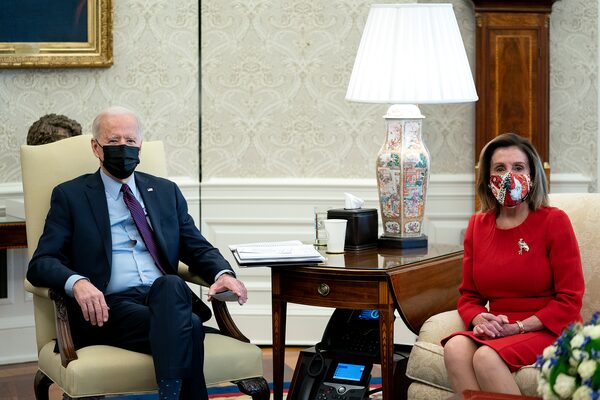
U.S. President Joe Biden and Speaker of the House Nancy Pelosi in the Oval Office of the White House, in Washington, on Feb. 5, 2021.Stefani Reynolds/Getty Images
U.S. President Joe Biden and his Democratic allies in Congress forged ahead with their US$1.9-trillion COVID-19 relief package on Friday as lawmakers neared passage of a budget plan that would allow them to muscle it through in the coming weeks without Republican support.
After an all-night debate, the Senate approved the budget measure before dawn, with Vice-President Kamala Harris casting the tiebreaking vote for the first time.
The House of Representatives was expected to approve the budget plan later on Friday, and Speaker Nancy Pelosi predicted the final legislation could pass Congress before March 15, when special unemployment benefits that were added during the pandemic expire.
Meeting at the White House, Mr. Biden and top Democrats said they wanted to enact the massive aid package as quickly as possible to beat back a pandemic that has killed more than 450,000 Americans and left millions jobless.
Continued weakness in the job market, underscored by data released on Friday, proved the need for aggressive action, Mr. Biden said.
“It’s people’s lives. Real-life people are hurting and we can fix it,” Mr. Biden said at the White House. “When we help them we are also helping our competitive capacity,” he said.
Republicans favour spending far less on COVID-19 aid than President Biden. Even some Democrats, such as Larry Summers, an economic adviser to president Barack Obama, have expressed concerns about the price tag.
Republican Representative Michael Burgess argued that about US$1-trillion remained unspent so far out of the roughly US$4-trillion Congress approved for pandemic relief last year.
“Why is it suddenly so urgent that we pass another $2-trillion bill?” Mr. Burgess demanded.
Senate Republicans have proposed a COVID-19 plan that would be roughly one-third the cost of Mr. Biden’s proposal. While their plan dovetails with the Democrats’ in some respects, Mr. Biden has deemed it as too anemic to put the country back on its feet after a year of suffering through the pandemic.
The budget resolution enables passage of Mr. Biden’s plan by a simple majority in the 100-member Senate instead of the 60 votes required for most legislation. That means Democrats will not have to have Republican support to get it through the Senate, where they have the slimmest possible majority that depends on Ms. Harris’ tiebreaking vote. Democrats have a bigger majority in the House.
In its overnight session, the Senate voted to oppose an immediate increase of the federal minimum wage from US$7.25 an hour to US$15 an hour. Senators also backed a motion calling for direct payments of up to US$1,400 to be tailored to low-income earners. The White House says it is open to that idea.
The House vote Friday is expected to accept the Senate’s changes.
The approved amendments do not carry the force of law in a budget blueprint, but can serve as guidelines for developing the actual coronavirus aid bill in coming weeks.
Our Morning Update and Evening Update newsletters are written by Globe editors, giving you a concise summary of the day’s most important headlines. Sign up today.